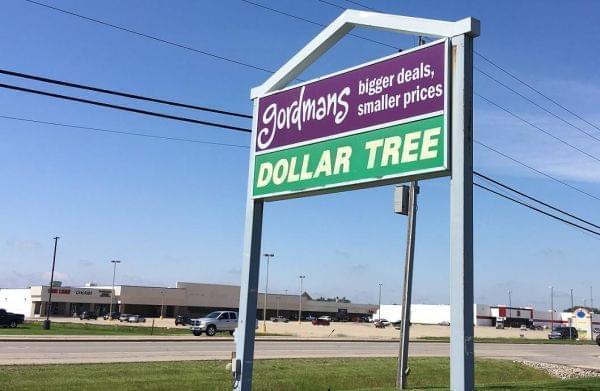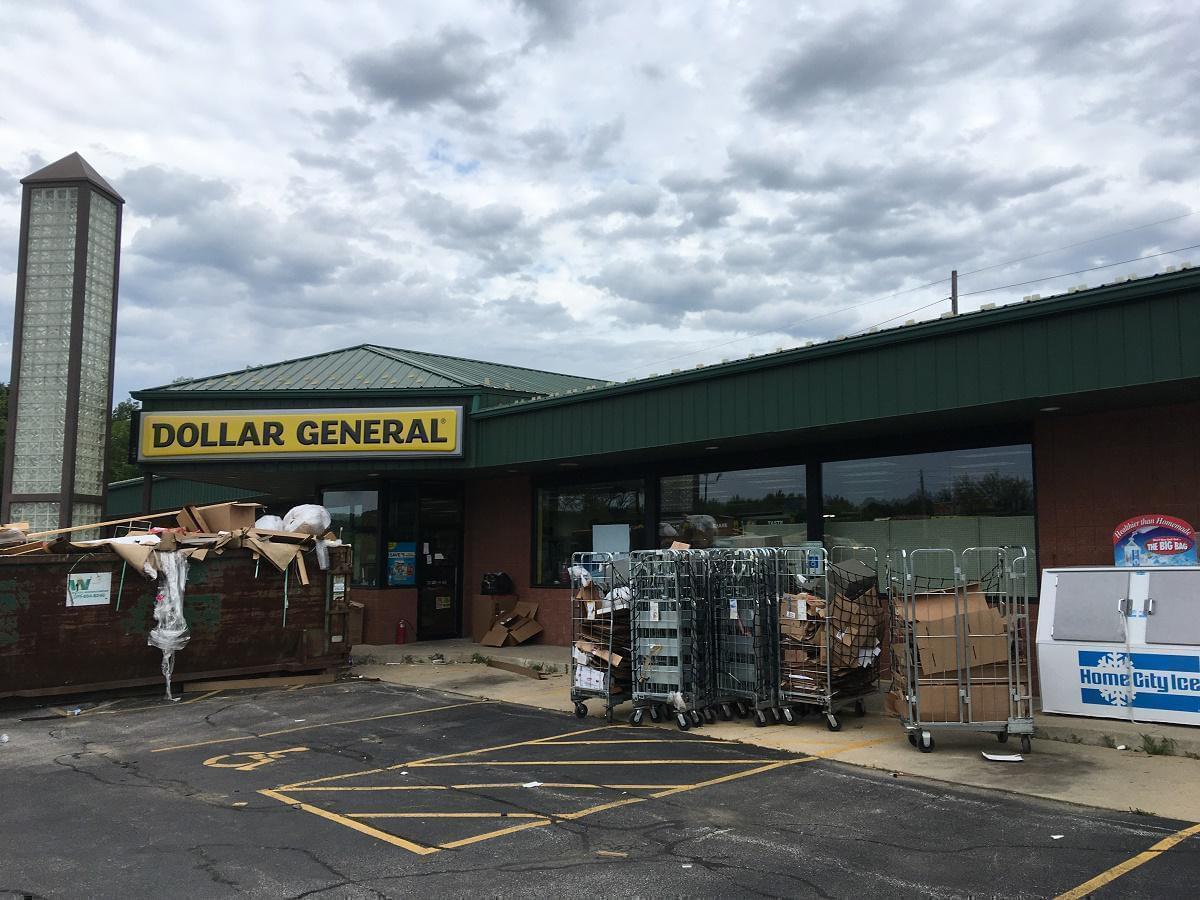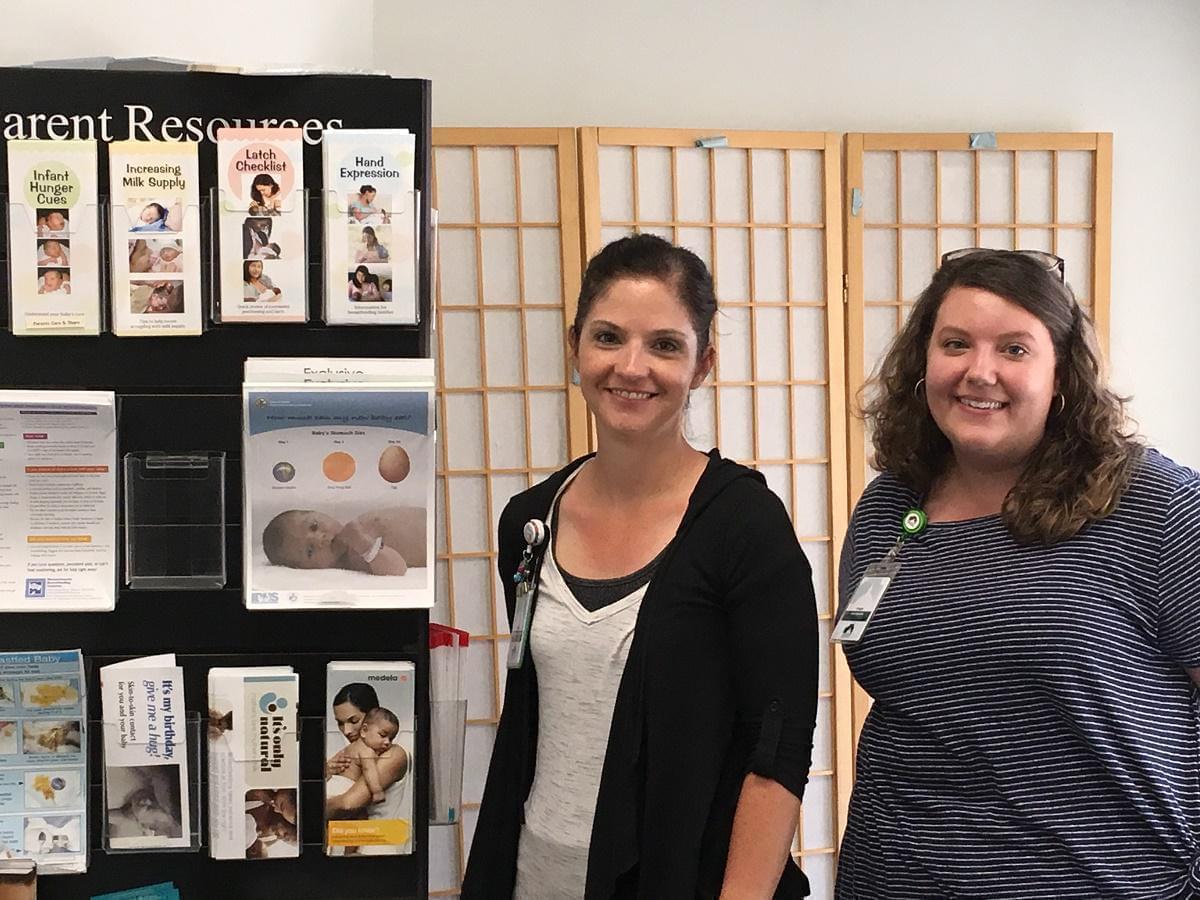Rural Illinois Hardship Becomes Dollar Stores’ Gain

This Dollar Tree store at 1310 Woodland Rd. in Lincoln could be benefitting from the Kroger store which recently closed across the street. Eric Stock/WGLT
Julie Catey of Broadwell loves shopping at the Dollar Tree store in neighboring Lincoln.
She commutes there daily for her work in home day care and at the local Cracker Barrel. She said she shops there “a lot.”
“My mom shops there daily. Her favorite place in the world is the Dollar Tree,” Catey quipped. “Because everything is a dollar.”
That's a sentiment more than a few people in Lincoln share. It's a community that's been hit hard by job losses in recent months.
When the economy suffers, as it has in many rural Central Illinois communities, shoppers tend to become bargain hunters, looking for the best deals to help stretch their ever-thinning dollar. That has helped expand the market for discount stores.
Those stores are helping to fulfill a need, but economists wonder if those "everything is a dollar" stores are only making matters worse.
The Dollar Tree that Catey pulled into is directly across the street from a recently shuttered Kroger store in Lincoln. That leaves three grocery stores in the town of about 14,000 residents: Walmart, Aldi and IGA. Not exactly an abundance of shopping options for fresh food.
“Walmart is so big and they are always out of everything, and the other grocery store is locally owned and it’s so expensive,” she said. “So (for) elderly people especially, they loved to go into Kroger and could get stuff so much easier. I think it’s very, very, very missed.”
Rebecca Curry was born and raised in Lincoln. She brought her two teenage sons to the Dollar Tree to pick up supplies to plant flowers that she got free from a local church. She shops at the Dollar Tree several times a week.
“The economy is hard right now,” Curry said. “It’s really bad, jobs are short and people are trying to save money.”
Curry is unemployed and her husband works at Caterpillar in Peoria, while her sons are detasseling corn at a local farm this summer. Her family, like many, is budget conscious.
“Not everyone in our town with our economy can afford to go to Walmart and spend $5 on ibuprofen when we can come here and get it for $1,” Curry explained. “I know the economy is pretty rough here.”
Lincoln residents say it's a mystery why Kroger closed.
Tracy Welch, mayor pro-tem in Lincoln, said Kroger pulled out because the cost of doing business at that location was too high. That's just one of several setbacks the Logan County seat has taken in the last few months.
Glass and metal manufacturer Ardagh Group closed its Lincoln plant in April, eliminating 150 jobs. Prior to that, Alexander Lumber of Bloomington announced it was closing its Lincoln store.
Welch said he's concerned about the spinoff effects of losing those big employers, how it impacts other businesses that rely on that customer base.
Several restaurants have also shut their doors in Lincoln.
“The economy in the state of Illinois and the country is going through a bit of a cycle now,” Welch said. “We have to be conscious to support all of our businesses if we want those to stay there. As you know, when businesses close, people lose jobs and when people lose jobs they start to do things like we are talking about here in trying to find cheaper alternatives.”
Lincoln is far from alone in experiencing the loss of manufacturing jobs that have hollowed out the rural economy.

Chris Merrett, director of the Illinois Institute for Rural Affairs, said many locally-owned grocery stores have suffered at the expense of dollar stores in lower-income communities.
Chris Merrett has seen it before. He's director of the Illinois Institute for Rural Affairs at Western Illinois University. His office has studied the impact dollar stores have on rural communities.
“If you look at small towns that have in fact seen their family-owned grocery store go out of business as a result of a Dollar General coming in, I think the argument would be they are in fact making it worse,” Merrett said.
Merrett said discount stores can effectively serve a low-income population, sometimes with name-brand items and longer hours than you might find at your local grocer.
What you'll rarely find, however, is fresh food. Staffs tend to be smaller with minimal overhead.
Merrtt said in some respects, dollar stores employed the Walmart model of supply-chain management and low-cost delivery, using its wholesale purchasing power to sell its products for less than any competitors; only the dollar stores took it a step further.
“Dollar Generals are going into communities that Walmart would have never even considered,” Merrett said. “In an urban setting, they tend to be minority, lower-income neighborhoods. In rural areas, they would be lower income.”
Merrett said while dollar stores are competing with Walmart from below, the retail giant has conceded some of that space, closing some lower-performing stores so it can focus more on competing with home-delivery retailers like Amazon.
While Walmart's meteoric rise often came at the expense at the mom-and-pop stores in rural America, Merrett said the dollar stores seem to be having much the same effect.
“Store managers will say, in their mind, there is no doubt,” Merrett said. “So, it’s not a coincidence. It has absolutely been a zero-sum game where the Dollar General gain is the local grocery store’s loss.”

Dollar General is taking over the former Family Video store at 1601 S. Main St., Bloomington.
Urban impact
Dollar stores can have a big impact on smaller communities, but for urban communities like Bloomington-Normal, they are ever present.
The Twin Cities has 13 dollar stores and will soon add a 14th. That will give the community as many dollar stores as McDonalds, Taco Bells and Burger Kings combined.
That 14th store is a Dollar General that's going up at a former Family Video in south Bloomington. It's less than a mile from another Dollar General and it's in an area the U.S. Department of Agriculture has specified as a food desert.
Unlike Dollar Tree, Dollar General does sell some stuff for more than a dollar, but still generally cheaper than what you can buy anywhere else.
Bloomington Mayor Tari Renner said it's not an ideal use of the retail space.
“We do have this thing called the free market and people can locate and sell the property in most cases however they want, unless it happens to be inconsistent with zoning or there are some other regulations or restrictions on them,” Renner said.
The city has been working with a nonprofit group that wants to bring a grocery store to a west Bloomington neighborhood.
Renner said Bloomington-Normal is large enough to where another dollar store won't have much impact, but he'd like to see more economic diversity in those neighborhoods where access to fresh food is scarce.
“We can certainly afford more Dollar Generals, but we also need to make sure that we leverage our full potential,” Renner said. “With all respect to Dollar General, lots of Dollar Generals are not reaching our full potential. I think there are some other businesses we can mix in there that are more beneficial to the community that will perhaps pay better.”
Some dollar stores have started selling fresh food. Back in Lincoln, there's a Dollar General on the city's east side that sells refrigerated food, such as milk, lunch meats and eggs, but no fresh fruits or vegetables. It's next to a mobile home park in a community that lacks quick access to a grocery store.
Mary Hays of Lincoln was shopping there. She's retired from a career in the medical field. She said for some in that lower-income neighborhood, that is their grocery store.
“That is why this store expanded and added a grocery area for those people that live here,” Hays said. “They don’t have to go all the way out to Walmart.”
Health Impact

Mary Colby (left) and Paige Meints of the McLean County WIC program say they educate consumers about making healthy food choices.
Those economic realities can raise health concerns. Food stamp recipients through the Supplemental Nutrition Assistance Program can use their benefits at dollar stores, but young mothers who are in the WIC program cannot.
WIC stands for Women, Infants and Children. Its benefits are similar to SNAP but can't be redeemed at dollar stores because of the lack of healthy food.
Paige Meints is a nutritionist with the McLean County WIC program, which the county health department administers. She said most food you get at the dollar store is bad for you—overly processed so it doesn't go bad. That means unhealthy levels of sodium in just about anything you buy.
“The biggest thing with canned vegetables is the sodium content,” Meints said. “(We teach them) how to use those canned things. If they since them off the sink before using them, that can be a great way to reduce that sodium.”
Mary Colby runs the McLean County WIC program. She said the program relies heavily on education to help families make healthy food choices, but she understands the lure of getting something to eat quick and cheap. She concedes some options are worse than others.
“I can see how some people may run to the dollar stores or discount stores to purchase a few items. However, I do feel like that’s more beneficial than running to a gas station and picking some things up there, so there can be some pros and cons,” Colby said.
Customers will ultimately decide the winners and losers in the retail and grocery marketplace by how they spend their dollars.
Chris Merrett at the Illinois Institute for Rural Affairs suggested it's better to spend your money local.
“Whereas the profits from the local, family-owned grocery store would have been reinvested locally or spent locally, the Dollar General profits will be repatriated back to headquarters in Tennessee and to shareholders,” Merrett said.
Merrett added it's easy to take for granted what mom-and-pops stores do for a community that larger conglomerates can't. He said many don't realize what they've got until it's gone.
“They see their local grocery store, it might be struggling, but they don’t have enough incentive to spend a few more pennies at the local grocery store rather than the Dollar General, they don’t fully appreciate it. Then, of course, when the grocery store goes out of business then they go ‘Oh, now I see what happened.’”
Dollar Tree has also moved to eliminate some of its national competition. Dollar Tree acquired Family Dollar in 2015. It closed close to 400 of those stores and is re-branding about 200 others as Dollar Trees. Four dollar stores open in the United States every day.
Dollar Tree and Dollar General declined WGLT's request for interviews.
Dollar Tree issued a statement from its corporate office in Chesapeake, Va.
“Our stores provide an affordable and convenient shopping option for customers, while creating jobs and investing in communities we serve,” said Randy Guiler, vice president of investor relations.
